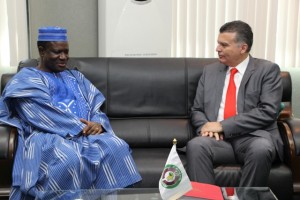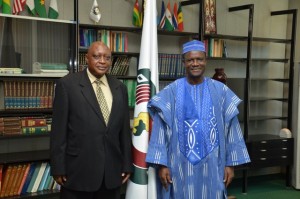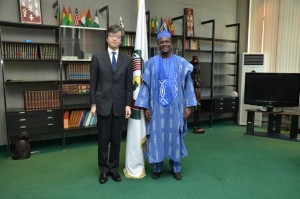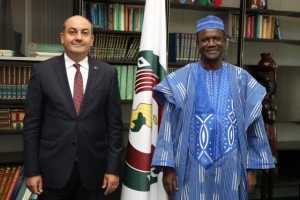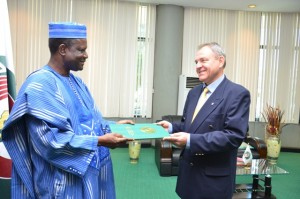ECOWAS Commission President Receives Letters of Credence from Heads of Diplomatic Missions
The president of the ECOWAS Commission Kadre Desire Ouedraogo has charged Heads of Diplomatic Missions to ECOWAS to work continuously in collaboration with the Commission in order to help in the realisation of the lofty Community programmes and projects.
President Ouedraogo stated this on the 17th of November 2015 in Abuja during the accreditation ceremony of five envoys to ECOWAS. They are ambassadors Hakan Cakil (Turkey), Eric Mayoraz (Switzerland), Sadanobu Kusaoke (Japan), Gen Louis Matshwenyego Fisher (Botswana) and Dr. Valerii Aleksandruk (Ukraine).
Corresponding to their globally acclaimed accomplishments and over which commitments were made, President Ouedraogo identified areas of collaboration with the countries to include infrastructural development, agriculture, transport, energy, education, security and human capacity development.
The ambassadors were received with gratitude from ECOWAS Commission to their home governments for the keen interest in the progress of ECOWAS which according to President Ouedraogo, necessitated the sending of the ambassadors for accreditation.
President Ouedraogo told the ambassadors separately while receiving their letters of credence: “I want to restate our availability to work closely with you for the success of your Mission in ECOWAS. I congratulate you. We have confidence that with your past experiences, you will contribute immensely to the growth of ECOWAS. It is good to see the excellent bilateral relations being replicated at the regional level”
They were thereafter furnished with corresponding acknowledgement texts.
Among the individual responses, ambassador Kusaoke of Japan pledged to help attract the interest of Japanese companies to the ECOWAS region. On his part, the Turkish envoy Mayoraz pledged to seek ways of institutionalizing a mechanism of greater cooperation on the identified areas of interest with ECOWAS.
The ECOWAS Commission accepts letters of credence from ambassadors of nations as a testimony of its openness to the deepening of political and economic cooperation for the greater integration of the region.



